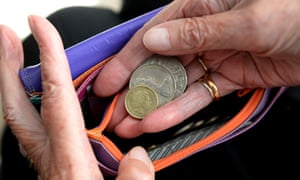More than 700,000 children among those below the poverty line, with low rate of Newstart, lack of jobs and rising housing costs the main drivers
Some 3.2 million people including more than 700,000 children in Australia are living in poverty at last count, according to a new report.
The Australian Council of Social Service and University of New South Wales’s Poverty in Australia report, released on Friday, found that more than one in eight people (13.6%) lived below the poverty line after housing costs were taken into account.
Acoss’s chief executive, Cassandra Goldie, said the low rate of Newstart, a lack of jobs and unaffordable housing were “locking people in poverty”.
“Not only has poverty remained consistently high in our wealthy country, the depth of poverty is getting worse, with households in poverty on average living 42% below the poverty line, up from 35% in 2007,” she said.
The report adopts what is known as the relative poverty line, set at 50% of the median household disposable income, and finds 3.24 million people in Australia were living below that marker of $457 per week in 2017-18. That included 774,000 children, an increase from the previous study.The Australian Council of Social Service and University of New South Wales’s Poverty in Australia report, released on Friday, found that more than one in eight people (13.6%) lived below the poverty line after housing costs were taken into account.
Acoss’s chief executive, Cassandra Goldie, said the low rate of Newstart, a lack of jobs and unaffordable housing were “locking people in poverty”.
“Not only has poverty remained consistently high in our wealthy country, the depth of poverty is getting worse, with households in poverty on average living 42% below the poverty line, up from 35% in 2007,” she said.
Using data from 2017-18, the most recent figures available, Friday’s report found the average poverty gap, which measures the difference between the poverty line and the average incomes of people in poverty, was $282 a week.
UNSW researcher Prof Bruce Bradbury said the main drivers of poverty trends were rising housing costs and the rate of social security payments.
“There have been increases in rents since about 2005 and there has also been a shift of homeownership rates, which have fallen over the past two decades, as has the proportion of people in public housing. Those things have combined,” Bradbury told Guardian Australia.
Overall, poverty had increased during the “boom years between 2003-08, after which it plateaued”, the report said.
It suggests that those on the lowest incomes had been left behind amid the uplift in incomes during the economic boom.
“Rates of poverty have gone down among the retired and they’ve gone up among the working age population.
“Unemployed people have been left behind. Newstart has fallen behind median income, it’s also fallen behind wages. It’s a lower fraction of the minimum wage than it used to be.”
Child poverty trends were impacted by the Howard and Gillard governments decisions to move single parents with children aged eight and older on to Newstart and another Labor government move in 2009 to index family tax benefits to inflation, rather than the faster-growing wages index.
Noting separate but similar data collated by the OECD, the report said Australia’s poverty rate was above average among OECD nations.
Last month Acoss announced it was now calling for a $95-a-week increase to Newstart, which has not risen in real terms in 25 years.
“The government has two reasons why they’ve kept it low, to keep incentives for people to look for work … the other explanation is in terms of budgetary constraints,” Bradbury said.
“I think there is a strong moral case for middle-class Australians to finance [an increase to Newstart] and help the most disadvantaged people in the country.”
The government and departmental bureaucrats have faced criticism in parliament from the Greens senator Rachel Siewert over its failure to adopt an official measure and definition of poverty.
Past Labor governments also did not refer to such a measure, although the opposition said on Wednesday it would introduce an annual nation’s wellbeing, from life expectancy to child poverty.

No comments:
Post a Comment